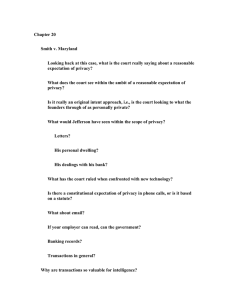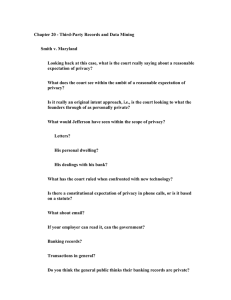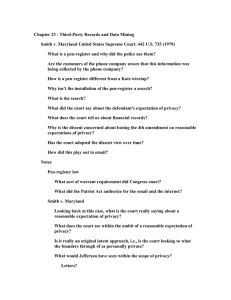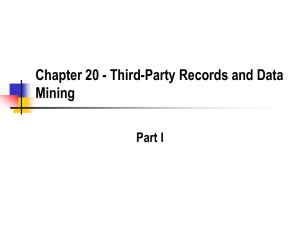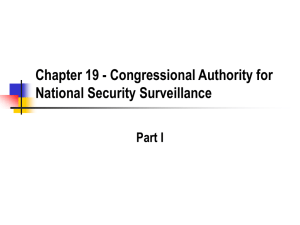Chapter 23 questions with added notes after Doe.
advertisement
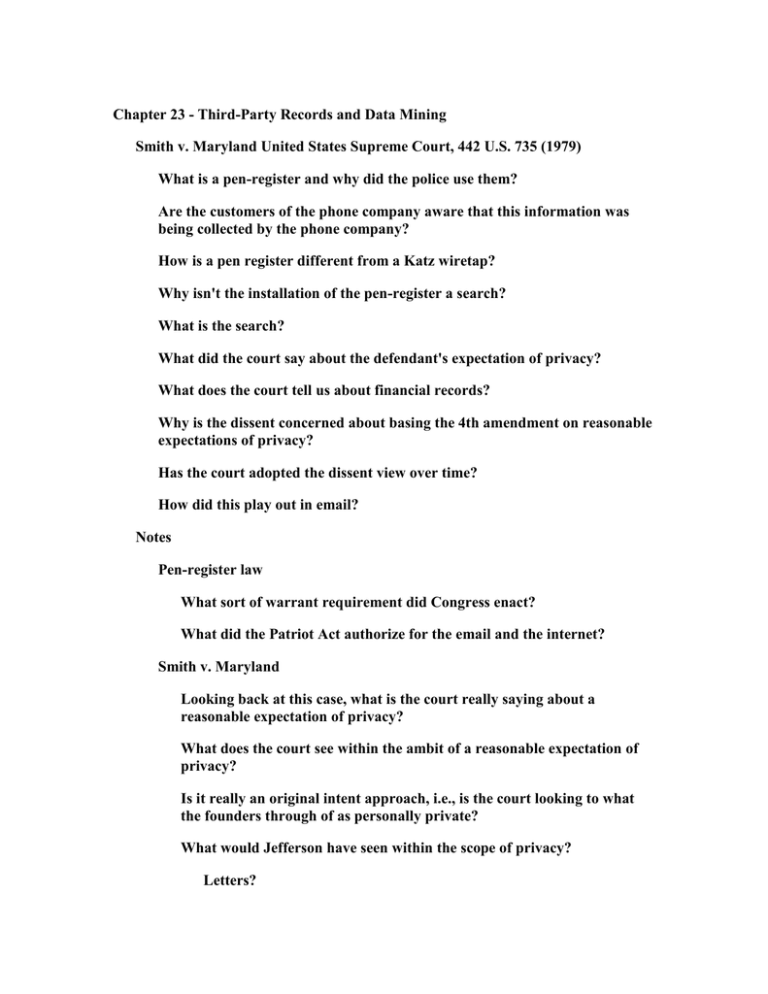
Chapter 23 - Third-Party Records and Data Mining Smith v. Maryland United States Supreme Court, 442 U.S. 735 (1979) What is a pen-register and why did the police use them? Are the customers of the phone company aware that this information was being collected by the phone company? How is a pen register different from a Katz wiretap? Why isn't the installation of the pen-register a search? What is the search? What did the court say about the defendant's expectation of privacy? What does the court tell us about financial records? Why is the dissent concerned about basing the 4th amendment on reasonable expectations of privacy? Has the court adopted the dissent view over time? How did this play out in email? Notes Pen-register law What sort of warrant requirement did Congress enact? What did the Patriot Act authorize for the email and the internet? Smith v. Maryland Looking back at this case, what is the court really saying about a reasonable expectation of privacy? What does the court see within the ambit of a reasonable expectation of privacy? Is it really an original intent approach, i.e., is the court looking to what the founders through of as personally private? What would Jefferson have seen within the scope of privacy? Letters? His personal dwelling? His dealings with his bank? What has the court ruled when confronted with new technology? Is there a constitutional expectation of privacy in phone calls, or is it based on a statute? What about email? If your employer can read it, can the government? Banking records? Transactions in general? Do you think the general public thinks their banking records are private? What do the banks say? Why are transactions so valuable for intelligence? Should the use of encryption be seen as probable cause for the government to go after the contents of the communication? U.S. v. Warshak, 631 F.3d 266 (6th Cir.(Ohio) 2010) Is this a national security case? What did the magistrate judge order Warshak’s ISP to turn over? including (1) customer account information, such as application information, ‘‘account identifiers,’’ ‘‘[b]illing information to include bank account numbers,’’ contact information, and ‘‘[any] other information pertaining to the customer, including set up, synchronization, etc.’’; (2) ‘‘[t]he contents of wire or electronic communications (not in electronic storage unless greater than 181 days old) that were placed or stored in directories or files owned or controlled’’ by the ISP; and (3) ‘‘[a]ll Log files and backup tapes.’’ Why only email more than 180 days old? Was this a 4th Amendment warrant? What type of order was this? How does the court bifurcate the expectation of privacy test? Did the court find that the defendant had an expectation of privacy in his emails? How was this manifested? The court relies on Katz for the example of privacy in telephone calls, but was that the original ruling on phone calls? Why did the expectation of privacy change? The court assumes that an email is the same as legally as a sealed physical letter, going through the post office. Is this really the right analogy? How do you know Gmail is not like this? What is the subscriber agreement says the ISP can read your mail for quality control purposes? United States v. Miller, 425 U.S. 435 (1976) – no expectation of privacy in banking records. How does this court distinguish Miller? How does the court’s reconcile its views of the expectation of the right to privacy in email with the Stored Communications Act? Do they exclude the evidence, and why? What additional issue did Judge Keith raise in his concurrence? There is a split in the circuits on this, but I do not think it is before the United States Supreme Court yet. How do you think the United States Supreme Court would resolve this? Does it have any effect on nationals security law? National Security Letter on page 650 What does paragraph 3 provide? Does this apply to the entity's lawyer? Does that raise constitutional issue? Doe v. Ashcroft (Doe I) United States District Court, Southern District of New York, 334 F. Supp. 2d 471 (2004) How was Doe to provide the requested records? Did Doe comply? Are NSLs reviewed by a judge? What does the government have to certify? Is there any requirement of probable cause? What did the government have to show before the Patriot act amendments? Is this probable cause of a sort? Did the NSL have to go to a judge before the Patriot Act? What are the usual standards for requesting enforcement of an administrative subpoena? What are the standards for review if the party sent the subpoena just complies? What do agencies have to keep the information secret for routine administrative subpoenas? What is the review process for criminal law subpoenas? How does the standard for review differ for evidence to be used at trial versus a grand jury subpoena? What other type of proceeding does the standard for a grand jury subpoena look like? Is grand jury information public? How about criminal trials? Can criminal law subpoenas be issued before there is a criminal proceeding or grand jury investigation? When are criminal law subpoena's reviewed? Why a different standard than for searches? Who are they directed to? What is the fundamental difference between the review of a physical search and an administrative subpoena? Is the court correct on this as regards administrative searches? What are the standards for an area warrant? What about physical searches of heavily regulated businesses or permitted businesses? How are these justified? Who asks for the review of subpoenas for transactional records? Is this the same as person whose privacy is being invaded? Is this a problem? What does the FBI have to do if the recipient refuses to comply with an NSL? Why do plaintiffs argue that for practical purposes the subpoenas are selfenforcing? How does the FBI pressure the recipient? How is the subpoena served? What sort of commandment does the court analogize an NSL to ? How many NSLs did the court think had been issued since 1986? How many had been challenged? What did the court think this implied? What have learned recently about how many NSLs were really issued? What were the grounds for the court finding that NSLs were unconstitutional? In what situations has the United States Supreme Court found a right to be anonymous? What two hypothetical situations did the court pose to find that the NSL might violate ISP subscriber's rights? What sort of challenge is the court proposing? Is this a proper role of the court? Which email field is the court concerned might be improperly disclosed? What does the government say about the expectation of privacy for internet users? What other interesting info does an ISP have? (Think Google) When does the court say the Internet is like a phone booth? What is the standard for review for prior restraint of speech, or contentbased speech restrictions? What does it take to justify such restrictions? Why does the court reject the FBI's claim that NSL restrictions are content neutral? When does the court think the government should get some deference as to secrecy about national security matters? Why not here? Notes Why was Doe I and the related case vacated? What change was made in the secrecy provision? How does this cure the constitutionality problem and transform these into a more typical administrative subpoena? How does Dempsey (p667) think the Patriot Act expands access to information? How does the Patriot Improvement Act change the relevancy standard? The government must provide more information, but does the court is the court in any better position to review the information? Will this make a difference? Why might businesses be reluctant to challenge NSLs? United States Dept. of Justice v. Reporters Comm. for Freedom of the Press, 489 U.S. 749 (1989) acknowledged what sort of protection for public information? What is the mission creep problem with data mining? What is the scary caveat in the thermal imaging case? Based on this analysis, what would you tell the president about a long term strategy to undermine personal privacy in favor of national security? Library records Why is access to library check out records so controversial? How about video store rentals? Netflix? Patriot Act Improvement limited access to library records, but did not end access: It left libraries subject to §215 orders, however, although it also limited the number of FBI officials who could approve §215 applications for library records, It also limited access to: ‘‘book sales records, book customer lists, firearms sales records, tax return records, educational records, or medical records containing information that would identify a person.’’ Are these all the same sort of records? What is an exigent letter? How can these undermine the NSL protections? What was the evidence they had become too widely used? What did the report on the use of NSL’s show most were used for?
